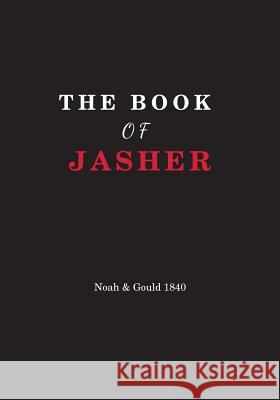The Book Of Jasher: Referred to in Joshua and Second Samuel » książka
The Book Of Jasher: Referred to in Joshua and Second Samuel
ISBN-13: 9781523821068 / Angielski / Miękka / 2016 / 298 str.
Faithfully Translated From The Original Hebrew Into English Noah & Gould 1840 M.M. Noah & A.S. Gould This is an EXACT reproduction (facsimile) of the original book published in 1840. Unedited and unaltered. First published in 1840. Get a copy that has not been fooled around with. These days that can be hard to find. According to some sources, this book was once the original start of the Bible. Whether that was true or not, we do know that it was once contained in the Bible, being referred to in Joshua and Second Samuel. It states, "Is not this written in the Book of Jasher?" in Joshua 10:13; and "Behold, it is written in the Book of Jasher," in 2 Samuel 1:18. These references have puzzled Bible students and scholars for centuries. Many versions of this book have appeared over the years and were proven to be forgeries. Therefore this version, which seems to be the clear and legitimate one, is often dismissed due to those many "pretenders" in the past. According to the translator (in his Preface), the reference to Jasher in Second Samuel is one place that authenticates this book, stating how it clears up an otherwise vague Biblical reference. At the same time he admits that some things seem to have been added to the book over the years, but that has happened to other works and, according to him, should not change the overall legitimacy found here. Not being experts in ancient Hebrew, we can only provide this rare work to the world and let those who read it be the judges as to its legitimacy and value. It's been claimed that the fable of creation in the Bible was compiled from this one book, in greatly altered form. Although we are not entirely sure, careful study of this book may in fact prove the claim to be true. The story behind The Book of Jasher is an interesting one. The Jewish priest named Esdras, or Ezra, was among the able-bodied men taken to Babylon as prisoners after Nebuchadnezzer captured Jerusalem in 587 BC. While there, Esdras studied holy Chaldean scrolls that dealt with the Creation. He condensed these works into scrolls that later became the Pentateuch, according to some, and they were then attributed to Moses. These scrolls later became part of the library at Alexandria. Around 389 AD the custodian at the library was informed of a plot to burn it down, so quickly gathered some of the more valuable scrolls together and sent them to Arabia for safe-keeping. One of them was The Book of Jasher. The library was indeed burned down, but Jasher, among only a few other valuable works, was saved.
Zawartość książki może nie spełniać oczekiwań – reklamacje nie obejmują treści, która mogła nie być redakcyjnie ani merytorycznie opracowana.











